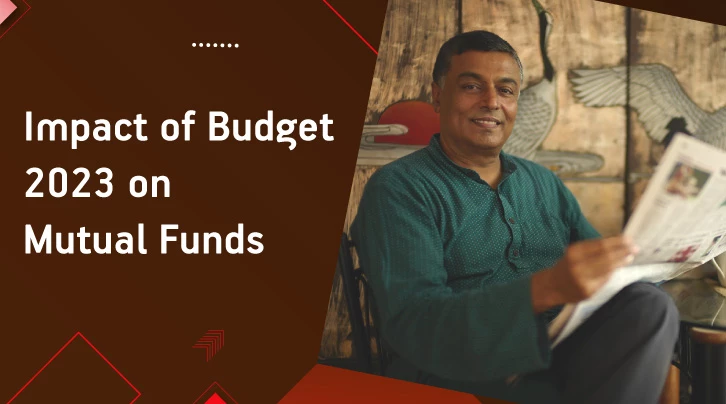-
Our Products
Our FundsOur High Return Funds
-
Self Care
Self-ServiceFind InformationWays To TransactPartner Solutions
-
Downloads
- Learnings
- About Us
-
More
-
Shareholders
-
Shareholders
-
Updates
-
-
Wealth Calculator
- Back
-
Shareholders
Impact of Budget 2023 on Mutual Funds

Apr 10, 2023
4 min
4 Rating
Summary
While mutual funds were missing from the Finance Minister's Budget 2023 speech, certain proposals announced could indirectly impact mutual funds. Read this post to know more.
Content
The expectations of the mutual fund industry from Budget 2023 mostly remained unfulfilled. There were no proposals for parity on Long-Term Capital Gains (LTCG) tax, the introduction of a Debt-Linked Savings Scheme (DLSS), the inclusion of FoF (Funds of Funds) in mutual fund definition, or more clarity on the functioning of international funds.
However, certain proposals announced in Budget 2023 can indirectly impact mutual funds in India. Let us take a closer look at these proposals-
1. Higher Spending on Energy and Infrastructure
According to the Expenditure Report of Budget 2023, ₹35,000 crores is earmarked for the green energy transition. A green energy transmission corridor will be built between Ladakh and Haryana to generate 13 Gigawatt of renewable energy. An additional investment of ₹20,700 crores is reserved for this project.
Moreover, the government also aims to launch over 100 infrastructure and transport projects with an outlay of ₹75,000 crores. The increased spending will significantly impact the energy and infrastructure industries and could benefit mutual funds that invest in them.
2. Simpler KYC
Every mutual fund investor must complete their KYC (Know Your Customer) before investing. Budget 2023 has announced a proposal to simplify KYC by adopting a ‘risk-based’ verification method.
Until now, every investor is required to go through the same KYC process. But with the ‘risk-based’ approach, low-risk investors can be onboarded faster with a simpler verification process, while high-risk investors will require additional verification.
Also read- What is KYC?
3. Government Borrowing and Fiscal Deficit Can Help Debt Mutual Funds
The budget impact on mutual funds can also be through government borrowing and fiscal deficit. According to Budget 2023, the revised fiscal deficit estimate for FY 2022-23 is 6.4% of the GDP. For FY 2023-24, the deficit is set at 5.9% of the GDP. To finance the deficit in 2023-24, the government will borrow over ₹11 lakh crore through dated securities or government bonds.
The higher government borrowing can work in favour of debt mutual funds, especially ones that predominantly invest in government securities. Fiscal consolidation and various ancillary factors can also help mutual funds investing debt-based securities.
4. Income Tax Relief
Budget 2023 also introduced several changes to the new income tax regime. From ₹2.5 lakhs, the basic exemption limit has been increased to ₹3 lakh. The standard deduction of ₹50,000 available under the older tax regime is now available in the new regime as well.
Moreover, the rebate of ₹12,500 under Section 87A has been increased to ₹25,000 for the new regime. As a result of these changes, salaried taxpayers with an annual income of up to ₹7.5 lakhs can have nil income tax liability. These proposals are expected to help people save more and boost private consumption. Ultimately, this could benefit the debt and equity markets.
How to Invest in Mutual Funds Post Budget 2023?
As no mutual fund-specific proposals were announced in Budget 2023, investors will have to read between the lines to create their investment strategies. For instance, you can increase your exposure to industrial sectors where government expenditure is set to increase. You can also consider adding debt funds to your portfolio, as they are expected to generate reasonable returns.
But while these proposals can indirectly impact your mutual fund returns, it is essential not to ignore your long-term financial objectives and asset allocation strategy. So, focus on building a diversified portfolio and avoid making risky investments to generate 'quick' profits.
Mutual Fund Investments in 2023 and Beyond
The indirect impact of budget on mutual funds can help the industry in many different ways. While investors are not advised to make significant changes to their mutual fund portfolios after Budget 2023, it’d be wise to look for newer opportunities based on the new proposals.
If you are new to mutual funds, understand the basics to avoid making expensive mistakes. You can also consult an investment advisor to help you build a mutual fund portfolio according to your goals and risk profile.
Mutual Fund investments are subject to market risks, read all scheme related documents carefully.





 1800-270-7000
1800-270-7000



